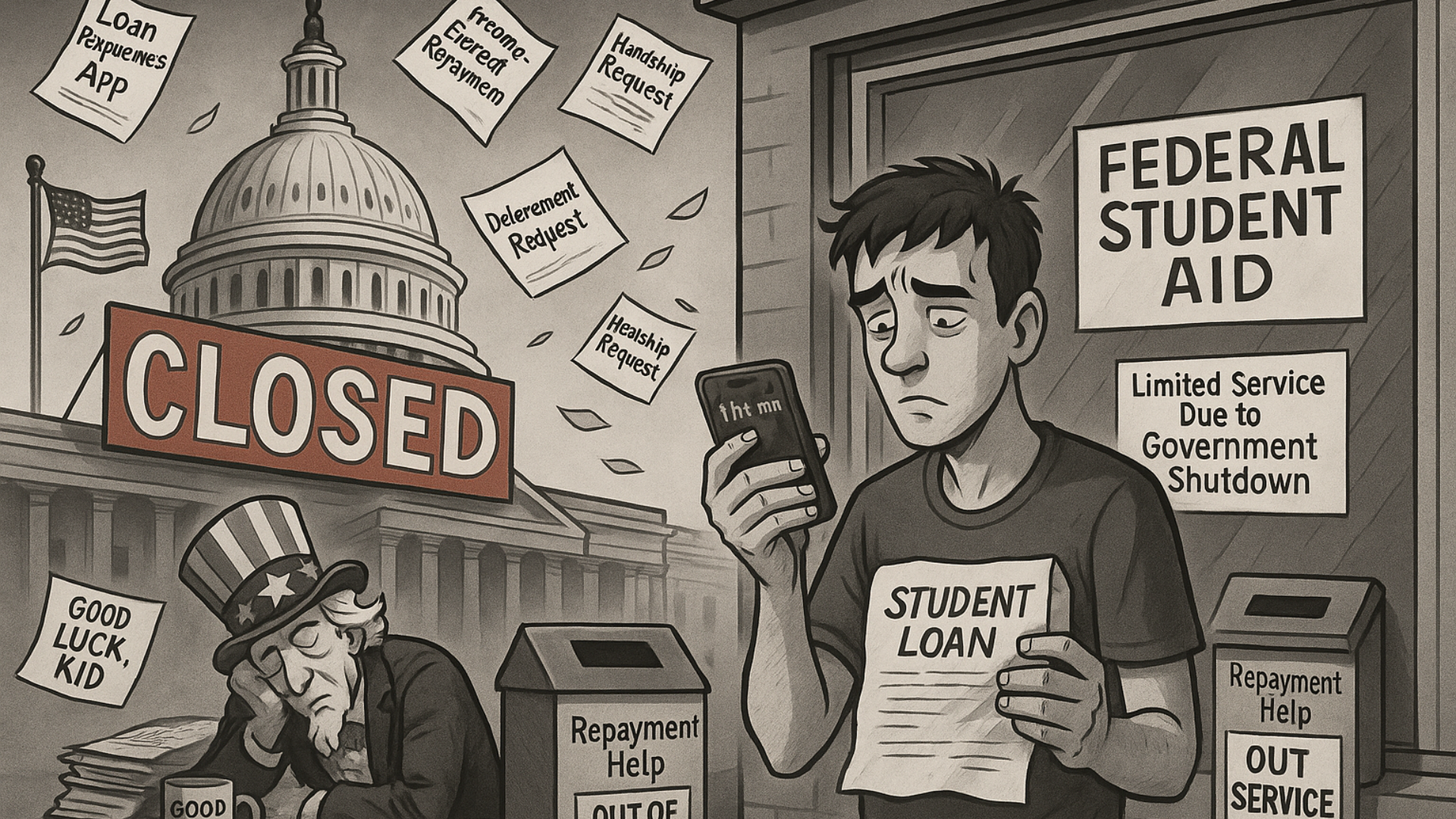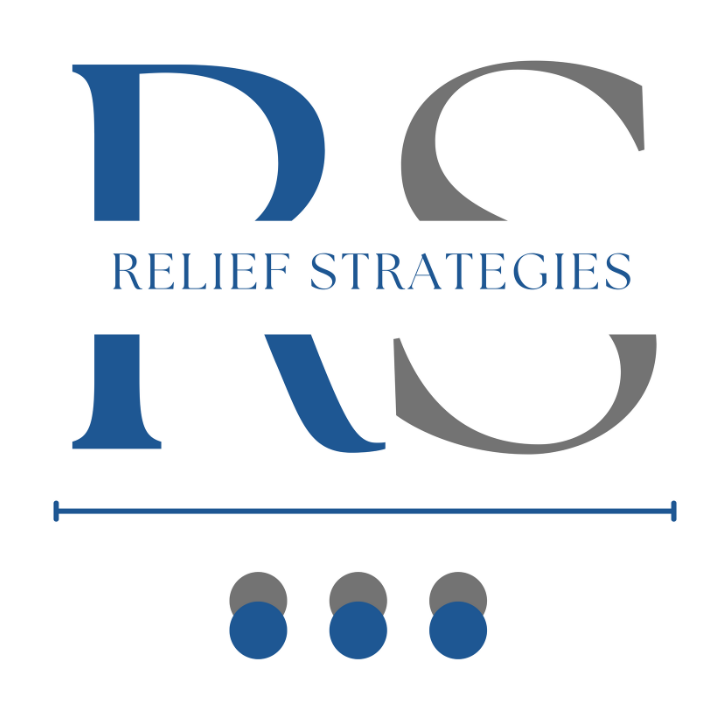By James Farias
Founder & CEO, Relief Strategies, LLC
Quick Summary
The 2025 U.S. government shutdown has thrown a wrench into the financial plans of millions of Americans, especially borrowers relying on federal student loans, grants, and credit support. With key agencies running at a fraction of their normal capacity, repayment help is harder to find, key applications are delayed, and the risk of administrative mishaps is on the rise. Here’s what every borrower needs to know to stay on track, and keep their credit safe, while Washington works through the gridlock.
Intro
At midnight on October 1, 2025, the U.S. government officially shut down, roiling federal agencies whose services millions depend on to manage debt, repay student loans, and navigate complex credit challenges (U.S. Representative Pettersen, 2025; NBC News, 2025). While political debates dominate the headlines, everyday people are left wondering: What happens if you need help, have loans due, or just want to avoid a credit hit in these uncertain weeks ahead?
This article cuts through the confusion, rounding up expert insights and the most up-to-date information from outlets like Newsweek, CNBC, and USA Today to arm you with the facts, and strategies, to protect your finances while the government is offline.
What Does a Government Shutdown Mean for Borrowers?
Over 85% of Department of Education and Federal Student Aid staff are now furloughed, according to reporting by LiveNow FOX and Newsweek. This means far fewer live agents are available to answer questions, handle complaints, or resolve disputes, just as borrowers need help the most. Experts cited in Newsweek and Business Insider warn that loan forgiveness applications, repayment plan requests, and dispute escalations will face serious delays.
Yet, not everything has ground to a halt. As CNBC and USA Today confirm, federal student loan payments and Pell Grants are still being processed. If you’re attending college or actively paying back loans, don’t stop your payments; your responsibilities continue even if support staff are limited.

How Will This Affect You? Real-World Borrower Issues
Borrowers calling servicers might find themselves stuck on hold or unable to reach help at all. Newsweek notes that any borrower seeking forgiveness, deferment, or a new income-driven repayment plan could find their application frozen until the shutdown lifts. Betsy May, Executive Director of TISLA, told Newsweek: “Most borrowers should be able to contact their servicers during a brief shutdown, but it becomes questionable if the shutdown extends.”
If you’re struggling to pay or need help, document every payment attempt and communication, these records will be crucial if a dispute later threatens your credit score or loan status.
Will Credit Scores or Other Debts Get Impacted?
Shutdown confusion and administrative delays increase the risk of late or missed payments, which can harm your credit score. Yahoo Finance recently reported that the shutdown itself is a negative signal for the U.S. government’s own credit rating. NBC News and Scope Ratings echo that financial market jitters are likely to tighten credit conditions, making it even harder for borrowers to access new credit or refinance existing debt.
Remember: private debts, like mortgages, car loans, and non-federal student loans, aren’t protected by federal shutdown policies. Communicate proactively with all your lenders.
Practical Strategies and Survival Tips

- Keep making payments through your loan servicer’s online portal whenever possible, as LiveNow FOX and Newsweek recommend.
- Document your account activity and payment attempts.
- Know that forbearance or hardship requests may take longer, use online and automated tools if available.
- Watch out for scammers pretending to offer relief during shutdown chaos, as Politico’s 2025 shutdown guide warns.
Final Thoughts & Next Steps
Once upon a time, a government shutdown may have seemed like a distant political event, but for borrowers today, its impact is immediate and personal. With fewer federal resources available and the risk of missed payments or delayed loan help, it’s important to be both vigilant and proactive.
Keep records of your payments, use online account tools when possible, and don’t hesitate to reach out to trusted financial advisors or relief organizations if confusion or hardship arises.
Federal loan obligations continue even as support staff are stretched thin, patience and careful planning will serve you well until Washington is back to work.
If you’re unsure or unable to get help from federal agencies, reach out to reputable debt relief sources, including Relief Strategies, for guidance and support during this challenging time.
For additional help and the latest updates, check trusted resources like StudentAid.gov or ReliefStrategies.com. We’re here to help you protect your future and reduce stress today.
Takeaways:
- Cut redundancy, sharpen the closing message.
- Maintain your “signature” supportive final note.
- Ensure readers have actionable links and next steps within the same wrap-up.
- Keep author bio and references exactly as you have them; they’re clear and professional.
Need Help?
Relief Strategies can walk you through your options and help you protect your future while addressing the stress today.
Visit ReliefStrategies.com or contact us at (888) 870-7922 for a free consultation.
About the Author
James Farias is the CEO of Relief Strategies, LLC, a firm dedicated to helping individuals achieve financial freedom through effective debt relief solutions. With over 30 years of business leadership experience and a deep passion for empowering others, James has guided many clients through the process of reducing debt and regaining control of their finances.
He understands how quickly debt can overwhelm even disciplined individuals and focuses on strategies that lower monthly payments, relieve financial stress, and create opportunities for a more secure future. Connect with James on LinkedIn or visit Relief Strategies to learn more about how he and his team can help you build financial confidence.
References
Business Insider. (2025, October 1). How student-loan borrowers will be affected by the government shutdown. https://www.businessinsider.com/how-will-government-shutdown-impact-student-loan-borrowers-debt-payments-2025-10
LiveNow FOX. (2025, October 1). Here’s how a government shutdown affects student loan payments. https://www.livenowfox.com/news/government-shutdown-student-loan-payments
Newsweek. (2025, October 1). How Student Loans Are Affected by a Government Shutdown: What to Know. https://www.newsweek.com/how-student-loans-are-affected-by-a-government-shutdown-what-to-know-10809971
CNBC. (2025, October 1). Government shutdown blocks student loan borrowers from forgiveness, repayment plans. https://www.cnbc.com/2025/10/01/government-shutdown-student-loan-borrowers.html
USA Today. (2025, October 1). What happens to student loans during government shutdown. https://www.usatoday.com/story/news/politics/2025/10/01/government-shutdown-2025-student-loans-pell-grants-fafsa/86455718007/
U.S. Representative Pettersen. (2025, September 30). 2025 Government Shutdown. https://pettersen.house.gov/services/2025-government-shutdown-resources.htm
Yahoo Finance. (2025, October 1). US government shutdown negative for credit rating, Europe’s Scope warns. https://finance.yahoo.com/news/us-government-shutdown-negative-credit-144823256.html
Politico. (2025, October 1). Government shutdown 2025: A guide to what’s still open, what’s closed and what’s fuzzy. https://www.politico.com/news/2025/10/01/government-shutdown-2025-whats-still-open-00195598
NBC News. (2025, September 30). Government Shutdown 2025: What to know on air travel, social security, student loans, SNAP, military and more. https://www.nbcnews.com/politics/congress/government-shutdown-2025-air-travel-social-security-impact-rcna234594
StudentAid.gov. (2025, October 1). Announcements and Events – Government Shutdown Information. https://studentaid.gov/announcements-events

